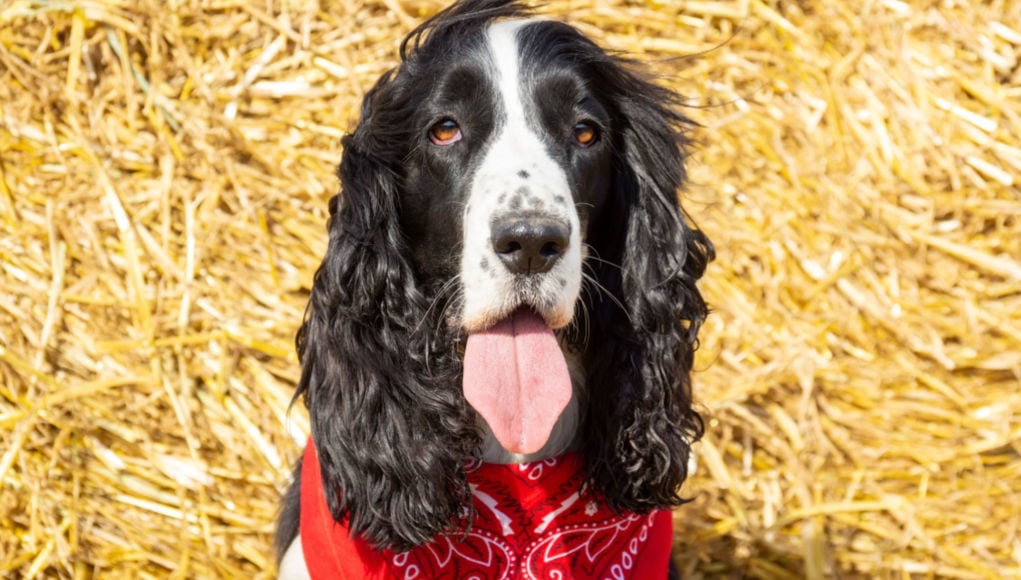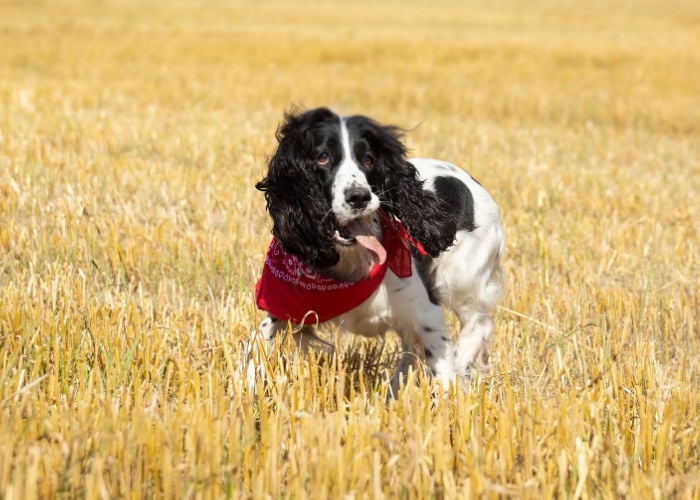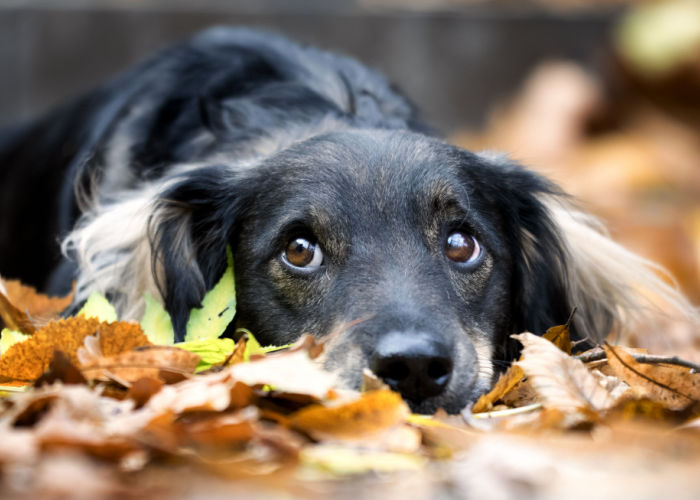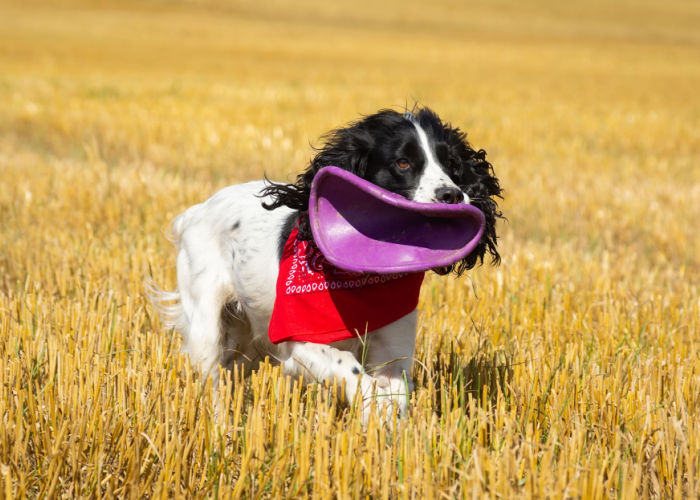Table of Contents
The Docker is a mixed breed dog, combining the Dachshund and a Cocker Spaniel. These dogs range in size from small breed to medium size.
This dog is the perfect combination of lounging around and bursts of energy. They enjoy hiking, playing fetch, or squirrel chasing.
These pups inherit the best qualities from each parent, making an outstanding, well-rounded dog.
Dockers occasionally go by a few other names, including the Spaniel Doxie and the Doxie Spaniel.
Despite the known status as a designer breed, these dogs end up in shelters and rescues.
Docker Dog Breed Overview
A Docker is a mixed breed dog that integrates two pure breed dogs (the Dachshund and Cocker Spaniel) into one designer breed.
The primary colors are typically red, brown, black, or tan. They are frequently solid but can have a second color mixed in.
These dogs will often have a combination of both parents' coats.
The coat may be short and wiry, like the Dachshund parent, or soft and silky, like the Cocker Spaniel's coat.
It's important to remember that the Docker isn't well suited for extreme weather. These dogs may require an extra layer in cold winters and extra shade in summer.
A docker can bark a fair bit, making them excellent watchdogs. Early training can help curb unwanted barking, especially if using positive reinforcement.
Remember, these dogs enjoy your company. They don't want to be left alone for long periods.
They may get anxious and destructive without companionship during the day.
The History of the Docker
The Docker dog breed may have existed naturally over the years. Still, people intentionally started breeding these dogs in the late 1990s.
Most experts believe the dog originated in North America by mixing Cocker Spaniels and Dachshunds.
Although both parent dogs were originally hunting dogs, the Docker stems from a different purpose.
The sole purpose of the Docker is to remain a loveable, furry, and friendly family member.
The History of the Cocker Spaniel
The term “cocker” derives from their use to hunt the Eurasian woodcock. Originating in the UK, hunters bred the Cocker Spaniel as a hunting dog.
When brought to the United States, breeders bred the dog to an entirely different standard.
These changes allowed the Cocker Spaniel to excel at hunting in the United States, primarily through the United States.
Some of the oldest records of this dog include a spaynel in the 14th century. Currently, the Docker isn't recognized as an official breed by most kennel clubs at this time.
The History of the Dachshund
Bred initially in Germany hundreds of years ago, the Dachshund hunted badgers.
There are three different varieties of Dachshund, all of which originated at other times. “Dach” means badger, and “hund” means dog.
The smooth coat variety started from a mixture of miniature French pointers and the pinscher.
The breed is also available in two different sizes: miniature and standard. Standard also stood as the original size.
The Dachshund has solid, short legs that are ideal for digging out prey and going inside burrows.
Hunters often used the larger versions of the breed to chase foxes or deer. Alternatively, the smaller breeds hunted ferrets and hares.
Traditionally, hunters still use this dog for hunting, particularly in Europe. North America often sees this dog as a family pet, sitting as one of the most popular AKC breeds.
The Size of the Docker Mixed Breed Dog
As the Docker is a relatively new breed, there are minimal standards regarding the size.
A mix of the Dachshund and Cocker Spaniel will often result in a dog between the two parent sizes.
This breeding will make most dogs between small and medium size. Most Dockers will weigh in at 20 to 30 pounds, ranging in height between 9 to 15 inches.
Many can be smaller or larger than this, depending on the parents. Female Dockers will often remain smaller than males of the same breed.
The Docker Personality
Many Docker enthusiasts will describe the dogs' personalities as an affectionate and loyal breed.
As these dogs come from a line of hunter parents, Dockers will often have a high prey drive and enjoy chasing birds, squirrels, and critters around the yard.
One major drawback of this breed is the tendency to bark a lot. Both parents are rather vocal, making them more likely to follow suit.
The Docker is an ideal match if you're looking for a watchdog that can alert anyone approaching the door.
If you're hoping for a quiet companion, you'll want to enroll the pup in early training to stop these habits from persisting.
These dogs are known for their stubborn attitude; hence, patience and consistent training will go a long way
The Docker doesn't like being left alone for long periods, as they can suffer from separation anxiety. The Docker is probably not an ideal fit if you're a single person having to work all day.
The Health of the Docker
The Docker is a mixed breed, predisposing them to the health conditions of the Dachshund and Cocker Spaniel. Although many Dockers are healthy, some may be prone to a few health conditions.
These dispositions make regular veterinary checkups and optimal care essential for overall health and wellness.
Potential health concerns will significantly depend on which parental traits are more dominant. The Docker is more susceptible to the following conditions:
Intervertebral Disk Disease
This degenerative disease can affect your dog's spinal cord and often causes many painful mobility issues.
This condition is also a ruptured, bulging, slipped, or herniated disk. Most often, the state is an age-related, gradual degenerative process.
It affects the dog's spinal cord over some time, often remaining undetected. Often, presenting symptoms aid a diagnosis, meaning acute or painful symptoms.
IVDD can occur anywhere along the discs of the spine. The condition depends on the damage and onset.
Symptoms of Neck Intervertebral Disk Disease
Cervical IVDD occurs in the disk of the dog's neck. Any of these symptoms require an immediate medical evaluation.
- Knuckling on all four paws
- Arching back
- Shivering or crying without cause
- Reluctance to moving
- Inability to stand or support own weight
- Inability to walk normally or unsteadiness in all four legs
Symptoms of Back Intervertebral Disc Disease (Thoracolumbar IVDD)
Dockers with Thoracolumbar IVDD have a singular damaged disc causing issues within the back region. They may display one of the following symptoms.
Thoracolumbar IVDD mainly impacts the mid to back portion of the dog's body. Symptoms may be mild to debilitating.
- Muscle spasms
- Tense belly
- Weakness in hind legs or inability to walk normally
- Inability to support their weight
- Unable to feel or move back legs
Diabetes
This condition is considered a chronic condition that impacts dogs and humans. Veterinarians can't cure diabetes, but they can manage it successfully.
The most common type of diabetes seen in dogs is diabetes mellitus, a metabolism disorder. The negative effect of diabetes on the body is profound.
Cells become starved of vital fuel, with muscle cells and specific organ cells deprived of the glucose fuel they need for energy.
The body eventually breaks down its fats to use as an alternate fuel.
Additionally, high sugar levels in the bloodstream damage the dog's organs. Without insulin production, high glucose levels build up in the blood.
The abnormal chemistry acts like a poison and eventually causes multi-organ damage. Typically, this includes damage to the eyes, kidneys, blood vessels, and heart.
Symptoms of Diabetes in Dogs
If your dog displays any of the following symptoms, it's always a good idea to have a vet evaluate your pup.
While some of these symptoms may be harmless, they can point to diabetes.
Excessive Thirst: When your dog drinks frequently and empties the water bowl more often.
Increased Urination: If your dog is asking to go outside more frequently or having accidents in the house, it may be due to excess sugars in the body.
Increased Appetite: Your dog may always become hungry because the body's cells aren't getting the necessary glucose.
Weight Loss: A dog may suddenly start losing weight despite eating normal portions (or more). This weight loss is because the pup isn't efficiently converting nutrients from its food.
More advanced symptoms of untreated diabetes include the following symptoms:
- Depressed attitude
- Vomiting
- Lack of energy
- Loss of appetite
- Seizures
- Kidney Failure
Urinary Track Issues
Most urinary tract infections (UTIs) are painful for the pup and can manifest into something more sinister if left untreated.
Many will resolve efficiently with treatment, not causing long-term damage.
In other situations, a UTI can suggest a more severe condition, such as cancer or poisoning.
The most common cause of a UTI in Dockers is a bacterial infection. A bacterial infection will impact 14% of dogs throughout their lifetimes.
A dog will get UTIs when the gastrointestinal (GI) or skin flora gets past the urinary tract's defenses.
The bacteria will colonize the urinary tract, leading to a painful infection. Most commonly, E. coli is the most common bacterial cause of UTIs.
Symptoms of UTI in Dogs
The most common UTI symptoms in dogs include the following:
- Straining or whimpering during urination
- Accidents in the house or needing to be let outside more frequently
- Licking around the urinary opening
- Fever
- Bloody or cloudy urine
Occasionally, your dog may not show any symptoms of a UTI at all. The veterinarian may discover the infection while testing for other issues in these situations.
Allergies
An allergy is a hypersensitivity or over-reactivity of the immune system to specific substances called allergens. Most allergens are from plants, insects, foods, or animals.
Exposure to the allergen, typically within months or years, will sensitize the immune system, causing an overreaction.
Symptoms of Allergies in Dogs
Most commonly, dogs will show symptoms of allergies through the skin. These issues may be localized in one area or occur throughout the body.
In some situations, the symptoms involve the respiratory system, including coughing, sneezing, or wheezing.
Many dogs can alleviate allergy symptoms through medications and antihistamines.
Care of Your Docker Dog
As with all pups, veterinary care is essential for identifying health concerns early on.
The vet can help you develop a healthcare routine early on to keep your dog in ideal shape.
As the Docker is prone to weight gain, ensure your dog gets at least an hour of walking daily, with a few active play sessions mixed in.
Always check your dog's ears for debris and inflammation, cleaning them as recommended by your vet.
Trim the dog's nails before they get too long, at least once or twice a month. If you can hear your dog's nails on the floor, they're too long.
The main focus of your Docker's care will be maintaining adequate oral health.
Make sure you brush the dog's teeth daily, as many small breeds are prone to dental issues. The vet can show you how to maintain their teeth properly.
Feeding Routines
The ideal Docker diet is one formulated for small to medium-sized breeds. Look for food geared to moderate to high energy levels.
The Docker tends to put on weight if overfed, so stick with regular feeding schedules and don't leave food out during the day.
The Docker's dietary needs will change from puppyhood to adulthood as they enter their senior years.
Talk to your veterinarian about your Docker's diet, as there are too many variations among dogs to make a generic recommendation.
Docker Dog Breed Conclusion
The Docker is an adorable combination of the Dachshund and Cocker Spaniel, bringing out the best traits in both breeds.
This dog is a loveable companion with high energy levels. These affectionate and local dogs get along well with people and other animals.
They enjoy spending their afternoons hiking, walking, or playing fetch.
Their alert nature makes this dog ideal for a watchdog, but they prefer spending time cuddling with their family.
Still, they can be stubborn when it comes to training or housebreaking.
If you want the playfulness of a Cocker Spaniel and the vigilance of the Dachshund, then the Docker dog breed could be just the pooch for you!


















